Spock and the Stoic Ideal
How Spock’s logical, disciplined approach to life represents an ancient masculine virtue: the ability to master one’s emotions for the greater good.
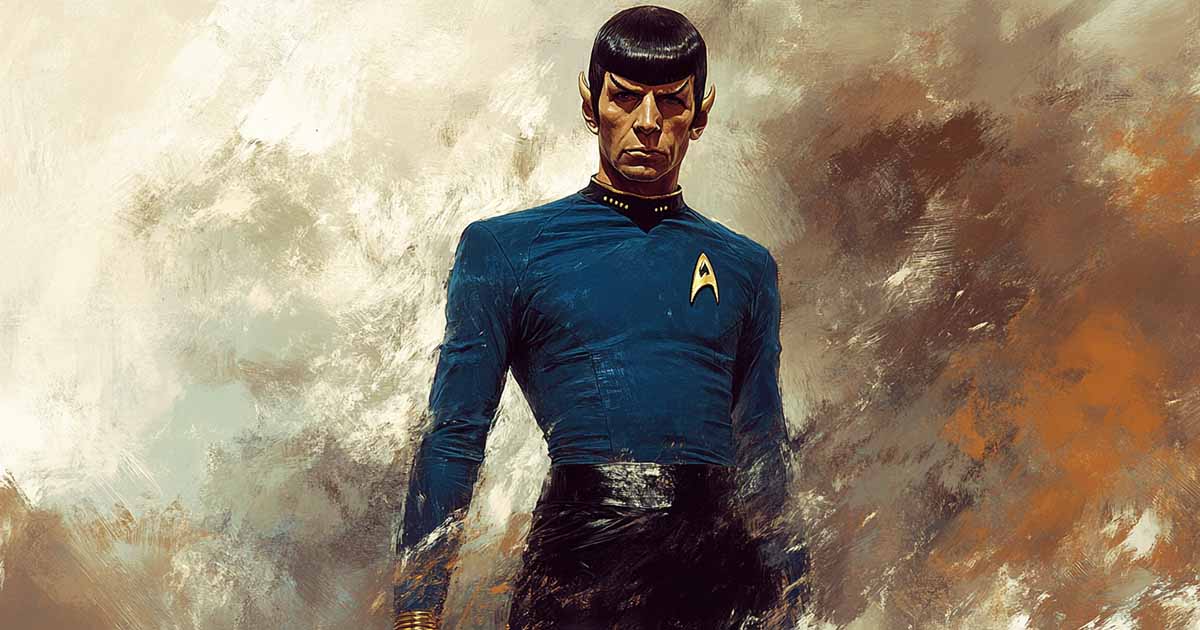
Few characters stand as timeless and universally respected as Mr. Spock. Introduced in "Star Trek" (1966), Spock became more than just a science officer aboard the USS Enterprise—he emerged as an enduring symbol of reason, restraint, and duty.
His influence extends beyond the confines of television and film, shaping generations of fans who admire his unwavering commitment to logic and self-discipline.
At first glance, Spock’s rigid adherence to logic may seem like a narrative gimmick—an alien quirk designed to contrast with the emotional outbursts of his human crewmates. But his character resonates so deeply because it taps into something far older than science fiction.
Spock represents an ancient masculine ideal—one deeply rooted in the philosophy of Stoicism, a school of thought that has guided men for centuries in their pursuit of virtue, resilience, and self-mastery.
Stoicism, as taught by thinkers like Marcus Aurelius, Seneca, and Epictetus, emphasizes control over emotions, unwavering discipline, and the prioritization of duty over personal comfort. These same principles define Spock’s character. He does not allow emotion to rule him. He does not seek personal glory. He acts according to what is right, regardless of how difficult the path may be.
In a time when self-restraint is often mistaken for repression and impulse is celebrated as authenticity, Spock stands as a rare and necessary example of masculine strength.
This article will explore how Spock embodies the Stoic ideal, why his character continues to captivate audiences, and what his example can teach modern men about discipline, duty, and emotional mastery.
The Ancient Roots of the Stoic Ideal
Long before science fiction put men on starships, ancient philosophers outlined a way of life that demanded discipline, reason, and virtue. This was Stoicism, a philosophy that taught men how to master their emotions, endure hardship with dignity, and serve the greater good. Born in the bustling marketplaces of Athens and refined in the halls of Rome, Stoicism shaped the character of statesmen, warriors, and scholars—men who understood that true strength was not found in brute force but in self-control and duty.
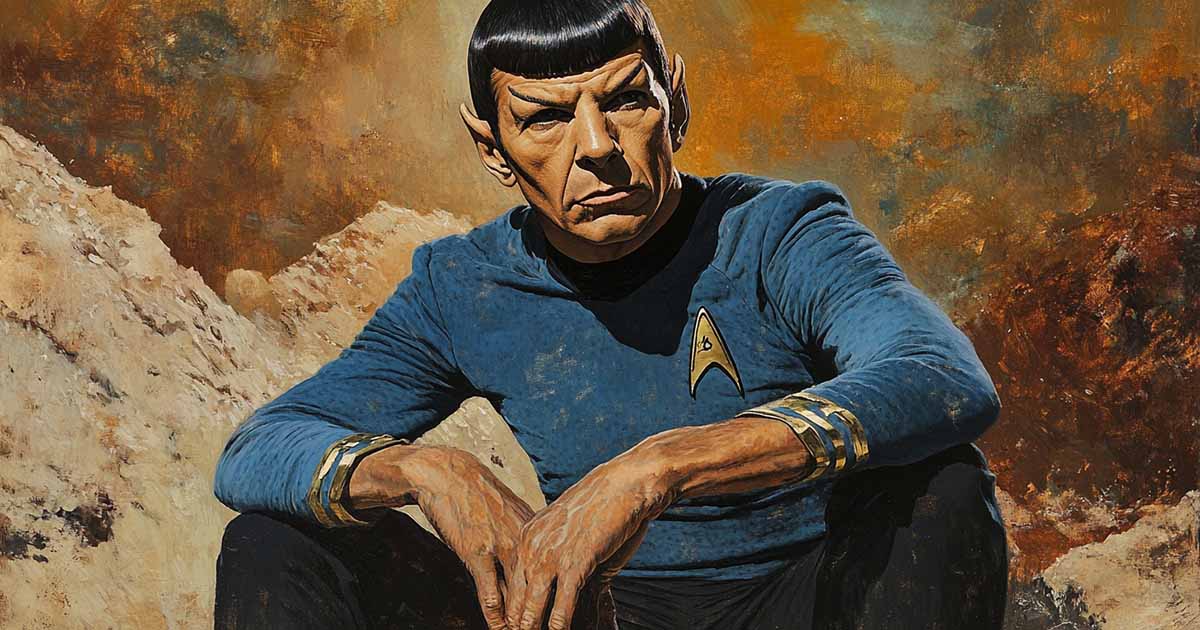
The Stoics believed in four cardinal virtues: wisdom, courage, justice, and temperance. They saw emotion—not as something to be indulged—but as something to be tamed. Marcus Aurelius, the Roman emperor and perhaps Stoicism’s greatest practitioner, put it plainly in his "Meditations" “You have power over your mind—not outside events. Realize this, and you will find strength.” To the Stoics, mastery of the self was the highest form of power.
This philosophy has long been a defining feature of traditional masculinity. The restrained warrior, the wise leader, the unshaken pioneer—all reflect the Stoic ideal. In American history, this kind of man was best embodied by the frontier settler and the self-made entrepreneur, men who thrived not through indulgence but through discipline and resilience. In literature, we see it in figures like John Carter of Mars, a man of both action and intellect, or Robert Heinlein’s spacefaring heroes, who approached every problem with reason and calm determination.
The influence of Stoicism extends naturally into classic science fiction because it is a philosophy built for men facing the unknown. Whether on the battlefields of ancient Rome or the final frontiers of space, the Stoic man does not complain. He does not give in to despair. He thinks. He acts. He endures.
This is the tradition that Spock embodies—not just the traditions of Vulcan logic, but the deeper, older discipline of men who refuse to be ruled by their emotions. His character draws from the same well of wisdom that shaped the great leaders and thinkers of history, making him a figure of timeless masculine strength.
Spock as the Embodiment of Stoic Masculinity
If the Stoics had set out to create a science fiction character who exemplified their philosophy, they could hardly have done better than Spock.
From his first appearance in "Star Trek," Spock operates with a clear and unwavering logic, often to the frustration of his human crewmates. But what makes Spock more than just an emotionally distant alien is that his restraint is not cold indifference—it is disciplined control. Like the great Stoics before him, Spock understands that emotions are real, but they must never rule over reason.
Logic Over Impulse
Spock’s Vulcan heritage and training emphasize logic above all else, mirroring the Stoic belief that reason is man’s greatest tool for navigating the world. Stoics like Seneca and Epictetus warned against allowing fleeting emotions to dictate one’s actions, arguing that wisdom comes from measured, deliberate thought. Spock is the embodiment of this principle. He does not lash out in anger, crumble under fear, or make rash decisions based on passion.
Take, for example, his interactions with Dr. McCoy. The ship’s irascible chief medical officer constantly challenges Spock, often baiting him with insults about his lack of feeling. A lesser man—or a lesser character—might respond in kind, but Spock never does. He meets McCoy’s barbs with calm detachment, defusing tension with measured responses or, when necessary, quiet amusement. This is not emotional suppression—it is control. Spock knows that reacting impulsively would accomplish nothing.
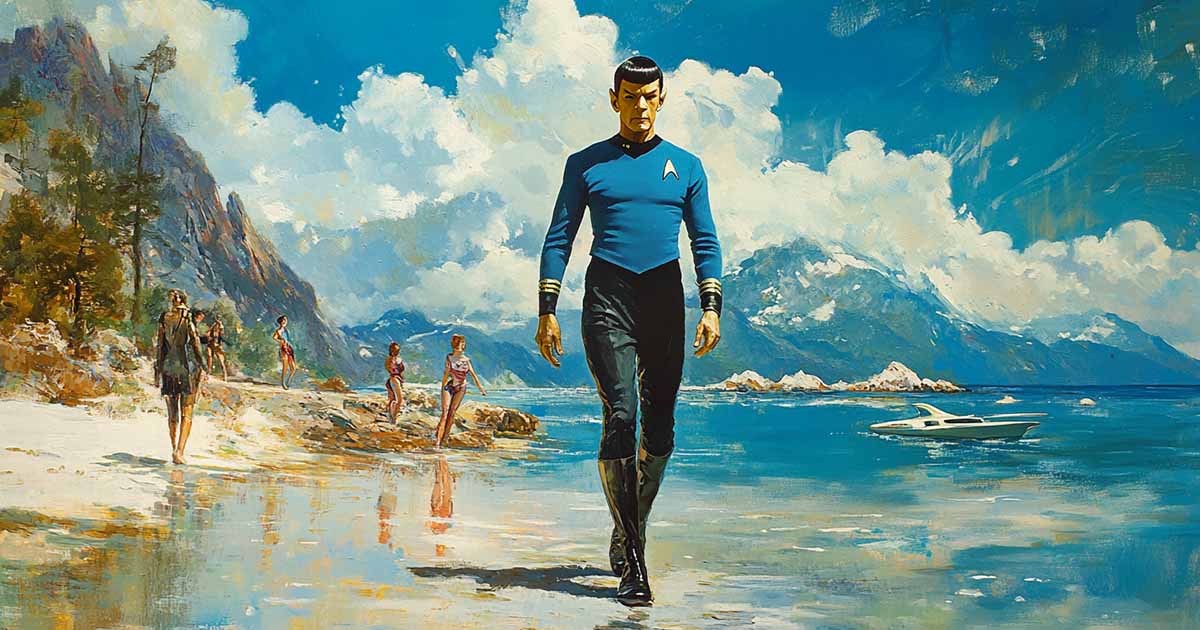
Duty and Service Above Self
One of the core tenets of Stoicism is that a man's duty comes before his personal desires. Marcus Aurelius, in his reflections on leadership, reminded himself daily to act with integrity, regardless of how he felt. Spock embodies this same sense of obligation. His commitment to Starfleet is absolute—not because he is chasing glory, but because he believes in the mission. He does what is necessary, even when it costs him personally.
The clearest example comes in "Star Trek II: The Wrath of Khan." As the Enterprise suffers catastrophic damage, Spock makes the ultimate sacrifice. Without hesitation, he enters the radiation-flooded engine room to repair the ship’s warp drive, knowing it will cost him his life. He does not hesitate, he does not complain, and he does not seek sympathy. His final words to Captain Kirk—"The needs of the many outweigh the needs of the few"—are a Stoic principle in its purest form. He dies as a man of duty, prioritizing the greater good over his own survival.
Resilience in Hardship
Stoicism teaches that suffering is inevitable, but how a man responds to suffering defines his character. Spock faces a unique struggle throughout his life—he is caught between two worlds, never fully accepted by humans or Vulcans. He is criticized for being too logical by one group and not logical enough by the other. Yet he never allows this to break him. Instead, he embraces the challenge, remaining steadfast in his identity.
In "Amok Time," when Vulcan customs force him into a brutal duel with Kirk, Spock does not protest his fate. He accepts the reality of the situation and proceeds with the same calm discipline that defines him. When he believes he has killed Kirk, he does not collapse in grief—he composes himself, because that is what must be done.
A Warrior-Scholar in the Stoic Tradition
The great Stoic men of history were not just philosophers—they were warriors, leaders, and strategists. Spock, too, walks this path. Though he is not an overtly aggressive character, he is highly capable in combat. He can fight when necessary, but he never does so out of rage or personal vendetta. He embodies the ideal of controlled strength—power that is used only with purpose.
Like the Stoics before him, Spock proves that true masculinity is not about dominance or unchecked aggression. It is about mastery—over the self, over emotion, over circumstance. He is not ruled by impulse. He does what is right, no matter the cost. In a world that often mistakes loudness for strength, Spock remains a quiet yet undeniable force.
McCoy, Kirk, and the Emotionally Driven Man
Spock’s Stoicism does not exist in a vacuum. His character is made all the more compelling by the men who surround him—particularly Dr. Leonard McCoy and Captain James T. Kirk. Where Spock embodies restraint and logic, McCoy is fiery and passionate, and Kirk operates as the decisive leader who balances both extremes. This dynamic was no accident. "Star Trek" creator Gene Roddenberry structured these three characters as a kind of philosophical triangle, with Spock representing logic, McCoy representing emotion, and Kirk standing between them as the figure of action.
Emotion as Strength and Weakness
Dr. McCoy, or "Bones," is Spock's natural counterpoint, a man who reacts with his heart rather than his head. He is impulsive, opinionated, and prone to outbursts, especially when dealing with Spock’s unshakable calm. Throughout the series, McCoy frequently challenges Spock's approach to life, seeing his reliance on logic as cold and inhuman.
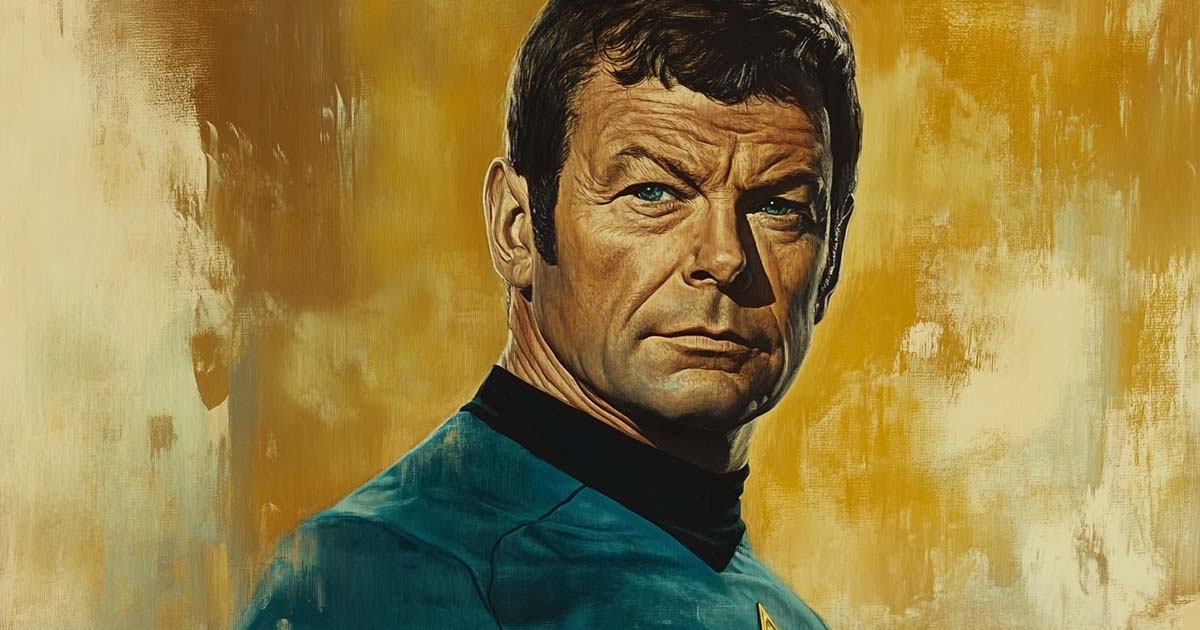
Consider their interactions in "Star Trek: The Original Series." McCoy is often the first to question Spock's lack of emotional response. When the crew is in danger, McCoy will shout, curse, or shake his head in frustration at Spock’s ability to remain detached. But despite his grumbling, McCoy’s relationship with Spock is not one of hatred—it is one of begrudging respect. He may not understand Spock’s control, but on some level, he recognizes its value.
Yet McCoy’s emotional nature is both a strength and a liability. It makes him compassionate and deeply human, but it also clouds his judgment. Where Spock analyzes a situation before acting, McCoy often reacts without thinking. His medical expertise is unquestionable, but in a crisis, he is prone to anger, frustration, or despair. Stoicism teaches that emotion, while natural, must be mastered—McCoy, for all his virtues, is a man who often lets emotion master him.
The Balance Between Logic and Passion
If Spock represents pure reason and McCoy represents raw emotion, then Kirk exists as the synthesis of the two—a man who embodies the virtues of both logic and feeling, wielding each as the situation demands. This is why Kirk is the captain. He understands Spock’s need for discipline and McCoy’s instinct for empathy, and he uses both to guide his command decisions.
Kirk is, in many ways, a classical hero—a man of action, decisiveness, and instinct. Unlike Spock, he does not suppress his emotions, but he also does not allow them to rule him. He is passionate but controlled, a leader who can deliver a rousing speech one moment and make a ruthless tactical decision the next.
Take, for example, "Star Trek II: The Wrath of Khan." When Spock makes the ultimate sacrifice, Kirk is devastated. But rather than collapsing under the weight of grief, he channels his emotions into action. He does not allow despair to paralyze him. He mourns Spock, but he also presses forward—because that is his duty.
Spock’s Role in the Triangle
The interplay between Spock, McCoy, and Kirk highlights the necessity of Stoicism in leadership and masculinity. McCoy’s raw emotional responses, while deeply human, can cloud judgment. Kirk’s ability to blend logic and emotion makes him an effective leader, but it is Spock’s presence that provides him with the intellectual and moral clarity to make the right decisions.
Spock’s Stoicism is not about rejecting emotion altogether—it is about ensuring that emotion serves reason, rather than the other way around. This is what separates him from McCoy. And while Kirk may be the leader, it is often Spock who prevents him from making impulsive decisions. Without Spock, Kirk could become reckless. Without McCoy, he might lose his humanity. The three men function as a unit, but it is Spock’s self-mastery that anchors them.
Why This Contrast Matters
The dynamic between Spock, McCoy, and Kirk illustrates a truth that men have wrestled with for centuries: emotion is a powerful force, but without discipline, it can become a weakness. In today’s world, men are often encouraged to "be in touch with their feelings" without being taught how to control them. Spock reminds us that masculinity is not about emotional suppression, but about strength—the strength to feel without being ruled by feeling, to care without being consumed, and to act with wisdom rather than impulse.
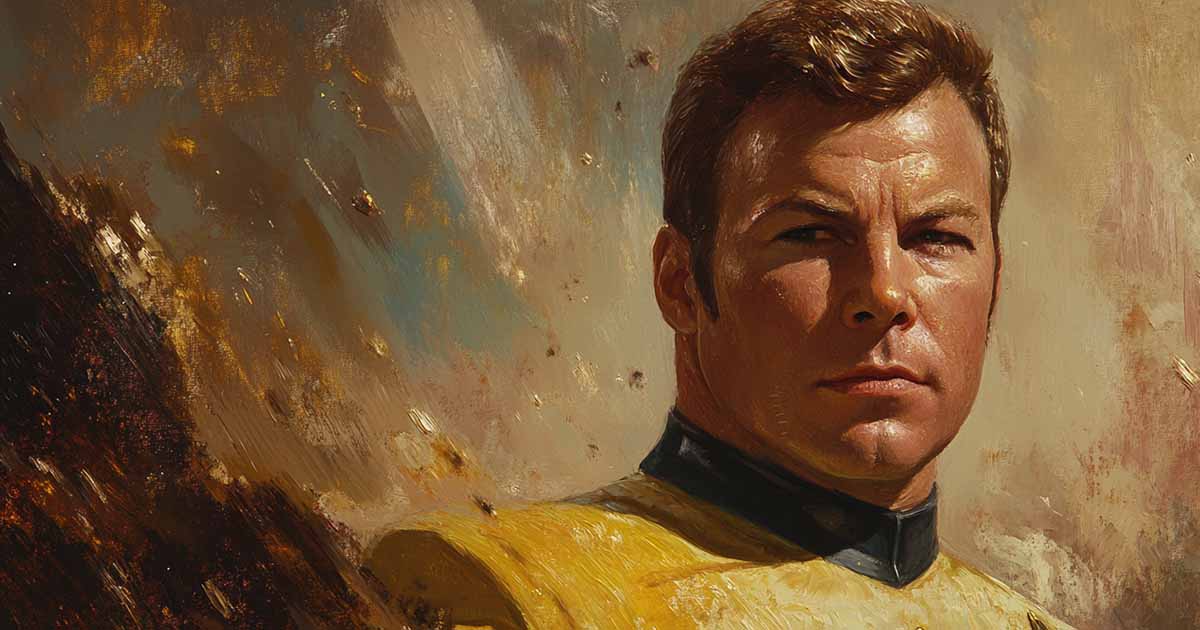
Kirk may be the hero, and McCoy may be the heart, but Spock is the foundation. He is the reminder that true strength is not about how loudly a man expresses himself, but about how well he masters himself.
Why the Stoic Ideal Matters Today
The world has changed since "Star Trek" first aired in 1966, but the virtues Spock embodies—discipline, self-mastery, and reason—are needed now more than ever.
In an era that often prioritizes emotional expression over emotional control, Spock stands as a reminder that strength is not about reacting but about responding. That masculinity, at its best, is about mastering oneself rather than being mastered by impulse.
The Modern Shift Away from Stoicism
In today’s culture, men are often encouraged to embrace their emotions freely, as though every feeling should be indulged and given voice. Restraint is frequently mistaken for repression, and self-control is dismissed as outdated. The result is not a healthier masculinity but a more unstable one—one prone to anger, despair, recklessness, or voting Democrat.
Stoicism does not teach men to suppress their emotions; it teaches them to control them. The great Stoic thinkers—Marcus Aurelius, Seneca, Epictetus—did not suggest that men should be unfeeling, only that they should not be ruled by their feelings. Spock’s character reflects this ideal. He is not emotionless; he simply refuses to let his emotions dictate his actions.
The modern world, in contrast, often rewards emotional outbursts. Social media encourages people to react instantly and publicly, prioritizing speed over thoughtfulness. In entertainment, heroes are often driven by vengeance or passion rather than principle. Spock reminds us that there is another way—the way of discipline, of logic, of calculated action.
The Power of Rational Decision-Making
One of the defining traits of a strong man is his ability to think clearly under pressure. This is a hallmark of Spock’s character. When faced with crisis, he does not panic. He does not allow fear to cloud his judgment. He assesses the situation, determines the best course of action, and executes it with precision.
This kind of thinking is invaluable, not just in starship command but in everyday life. A man who can remain calm under stress will make better decisions in his career, his relationships, and his responsibilities. In contrast, a man who is governed by his emotions—who lashes out in anger, crumbles under stress, or reacts impulsively—will find himself at the mercy of his own feelings.
Kirk may be the leader, but he leans on Spock’s steady rationality. A modern man would do well to do the same—to cultivate a circle of influence that encourages logic over hysteria, reason over impulse.
Stoicism as Strength, Not Weakness
There is a misconception today that being in control of one’s emotions is a sign of weakness. That a man who does not express every feeling openly is somehow less authentic. This is the opposite of the truth.
It takes no strength to be ruled by emotion. Any man can lash out in anger or crumble in despair. Strength is the ability to feel those emotions and still choose the right course of action. Strength is knowing that self-control is not repression, but power.
Spock’s character is proof of this. His presence commands respect not because he shouts, but because he doesn’t need to. His authority comes from his discipline. His wisdom comes from his ability to step back, assess, and act—not from reacting impulsively like McCoy or relying on instinct like Kirk.
What Men Can Learn from Spock Today
In a world that encourages emotional volatility, Spock offers an alternative. His example teaches men to:
- Master their emotions – Not by ignoring them, but by understanding and controlling them.
- Think before acting – Making decisions based on reason rather than impulse.
- Embrace duty and responsibility – Prioritizing what is right over what is easy.
- Seek knowledge and wisdom – Cultivating intellect and self-discipline rather than chasing immediate gratification.
These are not just traits of a great science officer—they are traits of a great man.
A Model of Strength for the Future
Spock’s Stoicism is not outdated. If anything, it is more relevant today than it was when he first appeared on screen. His ability to remain calm in crisis, to put duty above self, and to master his emotions rather than be mastered by them is a lesson every man can learn from.
The world does not need more men who react impulsively, who indulge every passing emotion, who allow their feelings to dictate their actions. It needs men who can think, who can lead, who can act with wisdom and discipline.
Spock, like the Stoics before him, shows us how.
The Lasting Influence of Spock and Stoicism
Spock’s character has endured for nearly 60 years because he represents something deeper than a fictional science officer aboard the USS Enterprise. He stands as a model of disciplined masculinity, a reminder that true strength is not found in brute force or emotional outbursts, but in self-mastery, duty, and reason.
His influence extends beyond science fiction. In Spock, we see echoes of the Stoic philosophers, men who understood that emotions are natural but must never dictate action. We see the discipline of the soldier, the wisdom of the statesman, the restraint of the man who knows that control over oneself is the foundation of all other strengths.
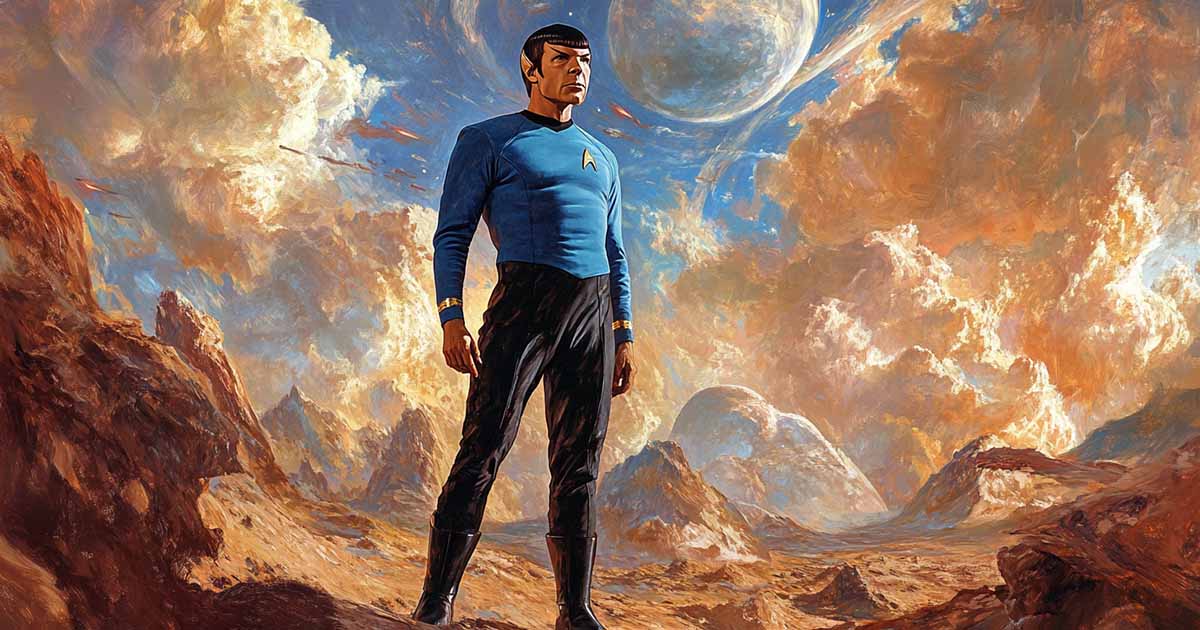
The Lessons Spock Leaves Behind
Spock’s legacy is not just in his adventures, his logical arguments, or his famous Vulcan salute. It is in the example he sets—one that modern men would do well to follow. His character teaches us that:
- Reason must guide action. A man who allows himself to be ruled by emotion will be tossed by every passing storm.
- Discipline is a mark of strength. The ability to remain steady under pressure, to think before acting, to control one’s impulses—these are the traits of a strong man.
- Duty is more important than personal comfort. Whether in war, leadership, or family, a man’s responsibility must come before his own ease.
In "Star Trek II: The Wrath of Khan," Spock makes the ultimate sacrifice, calmly accepting death so that his crew may live. It is a moment of pure Stoic virtue—he does not lament his fate, does not rage against the inevitable. Instead, he states his reason, "The needs of the many outweigh the needs of the few," and accepts his duty. His final act is one of service, logic, and honor.
Why Spock Still Matters
The world today is filled with distractions, emotional turmoil, and reactionary thinking. It rewards the loudest voices rather than the most disciplined ones. In this landscape, Spock remains a symbol of an older, stronger way of thinking—one where men do not need to prove their strength through dominance, but through control.
His legacy is not in the phasers or starships, not in the futuristic technologies or alien worlds, but in the simple, profound truth that a man who masters himself can master any challenge.
As Spock himself might say: Live long and prosper. But more importantly, live wisely.

